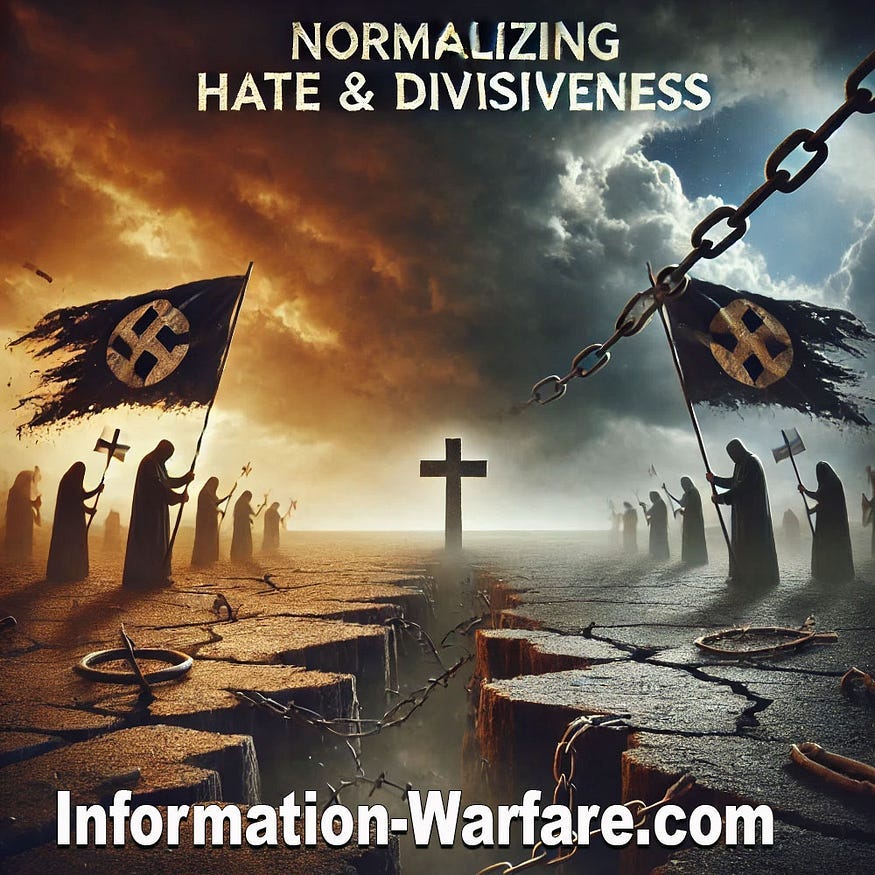Normalizing Hate & Divisiveness
The Growing Challenge of Purging MAGA from American Government
The phrase “Normalizing Hate & Divisiveness” refers to the process by which hate speech, discriminatory behavior, and divisive rhetoric become increasingly accepted in mainstream society or political discourse. When these negative attitudes and behaviors are normalized, they are no longer seen as extreme or unacceptable, but rather as part of the everyday conversation. This can lead to a more polarized society, where hostility and intolerance become more prevalent and even expected in certain contexts.

The phrase “Normalizing Hate & Divisiveness” refers to the process by which hate speech, discriminatory behavior, and divisive rhetoric become increasingly accepted in mainstream society or political discourse.
Key Points:
Normalization: The gradual acceptance of hate speech and divisive rhetoric as common or standard, often due to repeated exposure or endorsement by influential figures.
Impact on Society: This normalization can erode social cohesion, increase tensions between different groups, and undermine democratic principles.
Political Influence: Politicians or public figures who engage in or endorse such rhetoric can legitimize these attitudes, making it easier for others to express or act on similar beliefs.
Context:
The term is often used to criticize political leaders, media, or movements that are perceived as encouraging or tolerating hate and division, thereby lowering the societal standards for acceptable discourse and behavior.
“Normalizing Hate & Divisiveness” is a critical concern because it can have long-term negative effects on the fabric of society, leading to increased conflict, discrimination, and a breakdown in the values of tolerance and inclusivity. Recognizing and challenging this normalization is essential to maintaining a healthy and democratic society.
The Growing Challenge of Purging MAGA from American Government
The rise of MAGA-aligned candidates in local and state positions across the country is not just a trend — it represents a growing challenge for those who wish to see the influence of Trumpism purged from American government. As these candidates gain traction and win elections, the normalization of hate speech and divisive rhetoric continues to reshape the political landscape, making it increasingly difficult to reverse the effects of this shift.
The North Carolina Example
The recent election of Michele Morrow as the Republican School Board Director in North Carolina is a clear example of this trend. Morrow, a home-schooling parent and conservative activist, unseated the incumbent, Catherine Truitt, despite Truitt’s efforts to improve the state’s educational system and her broad support from established Republican figures. Morrow’s victory was largely fueled by her campaign against what she described as “radical agendas” in public schools — language that resonates with a broader MAGA narrative of fighting against supposed left-wing indoctrination.
Morrow’s campaign effectively tapped into fears that public schools are promoting progressive values on issues such as race, gender, and sexuality. By framing her opponent as part of a broader effort to “indoctrinate” children with these values, Morrow capitalized on the anxieties of conservative voters. This strategy is emblematic of a broader trend within the Republican Party, where candidates increasingly emphasize cultural and social issues to rally their base.
What is particularly alarming about Morrow’s election is her history of controversial and extreme views. She has been known to post comments suggesting the murder of former President Obama and other high-ranking officials — statements that would have once been disqualifying for any public office. In one instance, Morrow allegedly shared a social media post calling for the execution of Obama for treason, a shocking display of extremism that reflects the radicalization of certain segments of the electorate. Additionally, her rhetoric about wanting to dismantle the public school system reflects a dangerous disregard for the very institutions she is now elected to oversee. Yet, despite — or perhaps because of — these extreme positions, she gained the support of a significant portion of the electorate.
Morrow’s involvement in the January 6th march on the U.S. Capitol only adds to the concern. While she did not enter the Capitol, her participation in the protest signals alignment with the more extreme factions of the Republican Party. This event, which resulted in violence and chaos, was a stark reminder of the dangers posed by those who reject democratic outcomes. Her election is not just a local issue; it reflects the growing success of candidates who embrace the MAGA ideology, which often includes a disregard for democratic norms and a willingness to use fear and anger as political tools.
The Normalization of Divisive Rhetoric
Under Trump’s influence, hate speech and divisive rhetoric have become increasingly normalized in American politics. What was once considered fringe or unacceptable has moved into the mainstream, particularly within the Republican Party. The criteria for election success on the right have shifted accordingly, with candidates often prioritizing social conservatism, opposition to progressive values, and alignment with Trump’s agenda over more traditional political platforms.
This normalization is dangerous because it lowers the bar for acceptable public discourse, making it easier for extremist views to gain legitimacy. The use of inflammatory language, once taboo, is now a common strategy for rallying voters. This shift has been evident in numerous campaigns across the country, where candidates have leveraged cultural grievances and conspiracy theories to galvanize support. For example, the widespread acceptance of the “Big Lie” — the false claim that the 2020 election was stolen — has fueled distrust in democratic institutions and paved the way for more extreme candidates to enter the political arena.
As MAGA-aligned candidates continue to win local and state elections, they embed themselves deeper within the fabric of American government. Their presence makes it more challenging to remove or counteract the influence of Trumpism in future elections. These lower positions, though not as visible as national offices, play a crucial role in shaping policies, influencing public opinion, and setting the stage for the next generation of political leaders.
A National Trend with Dangerous Implications
The situation in North Carolina is not an isolated incident; it is part of a larger national trend. Across the country, candidates who embrace divisive rhetoric and extreme positions are finding success, particularly in primaries where voter turnout is often low, and the most motivated and ideologically driven voters have the greatest influence. This trend is reshaping the Republican Party and, by extension, American politics as a whole.
The consequences of this trend are far-reaching. As hate and fear become more ingrained in the political strategies of the right, the future of American democracy faces significant challenges. The values that have traditionally guided the nation — compromise, compassion, fairness, equality, and the common good — are increasingly under threat from a political movement that prioritizes domination, ego, and greed. The erosion of democratic norms, the spread of misinformation, and the increasing polarization of the electorate all contribute to a political environment where extremism can thrive.
The success of candidates like Michele Morrow signals a broader shift within the Republican Party, where the fringe is increasingly becoming the mainstream. This shift is not just a matter of rhetoric; it has real-world implications for policy and governance. As more MAGA-aligned candidates take office, they will have the power to implement policies that reflect their extreme views, further entrenching their influence within American government.
The Path Forward
Addressing this challenge requires a concerted effort to promote democratic values, counteract misinformation, and encourage broader voter engagement. It also requires a recognition that the influence of MAGA-aligned candidates will not be easily purged from the political landscape. Their success in lower-level elections builds a foundation for future influence and makes it more difficult to reverse the tide of extremism.
One of the most important steps in countering this trend is to foster a political culture that values truth, transparency, and accountability. This means challenging misinformation whenever it arises and holding candidates accountable for their statements and actions. It also means working to restore faith in democratic institutions by ensuring that elections are free, fair, and secure.
Voter engagement is another critical component of the solution. In many cases, the success of extreme candidates is driven by low voter turnout, particularly in primaries. Encouraging broader participation in the electoral process — especially among moderates and progressives — can help counterbalance the influence of the most ideologically driven voters. This requires not only mobilizing voters but also making it easier for them to participate, whether through expanded access to early voting, mail-in ballots, or voter education efforts.

Finally, it is essential to build a coalition of Americans who are committed to preserving the principles of democracy. This coalition must transcend partisan lines and include individuals from all walks of life who believe in the importance of fairness, equality, and justice. By working together, we can push back against the forces of extremism and ensure that American democracy remains strong.
Ultimately, the future of American democracy depends on the ability of the electorate to recognize and reject the politics of hate and division. It is a daunting task, but one that is essential if the country is to preserve the principles that have made it a beacon of freedom and justice. The stakes are high, and the time for action is now.

